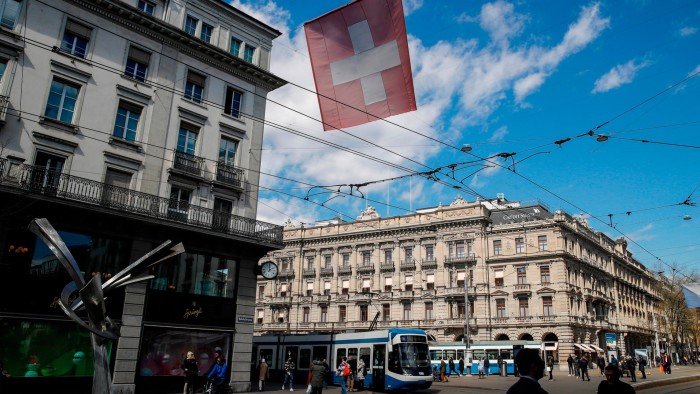Stay informed with free updates
Simply sign up to the Media myFT Digest — delivered directly to your inbox.
Swiss authorities have raided the offices of popular financial blog Inside Paradeplatz over suspected violations of banking secrecy laws, as media reporting on financial misconduct becomes more restricted in the country.
Lukas Hässig, the journalist behind the blog told the Financial Times that officials from the Zurich prosecutor’s office and police officers had also searched his private residence.
The searches, which resulted in the seizure of a laptop, a cell phone and several documents, took place on June 3, said Hässig, who earlier reported the raid on his blog.
He said on his blog that a judge would decide what material gathered during the raids may be used in any further investigation.
The alleged violations of bank secrecy laws relate to criminal proceedings in connection with the case of Pierin Vincenz, former chief executive of Raiffeisen Switzerland.
Vincenz was jailed for nearly four years in 2022 for fraud and criminal mismanagement after a trial that exposed allegations that he used a company credit card to pay for strip clubs, Tinder dates and holidays.
Hässig said he would fight any charges. “If journalists cannot write this in Switzerland and write about criminal acts, we have a problem in this country,” he said.
Switzerland’s strict secrecy laws have often shielded financial institutions and individuals from scrutiny. The laws prohibit the disclosure of confidential financial information and criminalise the publication of some leaked data, even when disclosure may be in the public interest.
For journalists and media organisations, this creates a challenging environment that restricts investigative reporting on issues such as money laundering, tax evasion and financial misconduct involving Swiss institutions.
Hässig said to the FT that the situation was “a threat to Swiss media, as possible criminals might be protected by our banking secrecy”.
The investigation comes after media reports in recent years exposed serious mismanagement at Swiss banks, including press articles on scandals that led to the demise of Credit Suisse and risk management failures at Julius Baer that resulted in regulatory investigations.
The public prosecutor’s interest in Inside Paradeplatz — named after the square in Zurich that is the centre of the city’s finance industry — revolves around three articles in 2016 investigating private investments made by Vincenz and his adviser Beate Stocker.
Both individuals’ bank account data at Julius Baer was leaked to Inside Paradeplatz, prompting an internal investigation by the bank.
Hässig’s reporting led to internal investigations at Raiffeisen Bank. Finma, the Swiss market regulator, eventually intervened. Vincenz had his original sentence overturned but following a further court ruling has launched another appeal, which is scheduled for summer 2026.
The Swiss Banking Act imposes penalties on anyone disclosing information deemed confidential, regardless of how that information was obtained. An extension of the banking secrecy penal code came introduced in 2015 allows for the prosecution of third parties, such as journalists, for breach of secrecy even if they have no direct connection to a bank.
Penalties include up to five years in prison and a fine of SFr250,000.
In 2022, Switzerland’s Federal Data Protection and Information Commissioner reaffirmed that the publication of leaked data could be punishable under Swiss law, even if it had already been made public by other means.
In April, the International Press Institute called for urgent reform of Switzerland’s “draconian banking secrecy laws to ensure that they cannot be misused to criminalise or silence public-interest news reporting”.
Peter Kunz, a professor at the University of Bern specialising in economic and financial law, said no journalist had yet been sentenced under the 2015 legal provision, known as article 47. Hässig’s prosecution was a “troubling sign for press freedom”, he said, adding the move could hit the country’s reputation.
Hässig said his case could have a chilling effect for both domestic and foreign journalists in the country. “The 2015 move had huge implications for journalistic work,” he said.
The Zurich public prosecutor said: “The evidence gathering is related to pending criminal proceedings . . . on suspicion of violating banking secrecy. The presumption of innocence applies until the final conclusion of the proceedings. We are not providing any further information due to the ongoing proceedings.”







